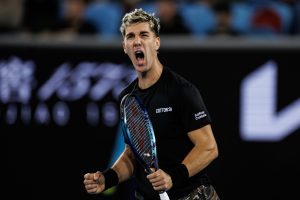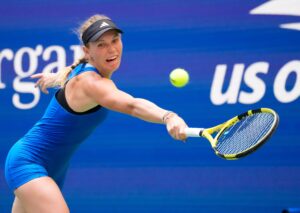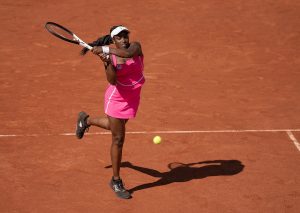There is no greater story in sport, or indeed in life itself, than the comeback. Resurrection stories, in which a player or team seemingly returns from the dead (or its sporting equivalent), are probably the great universal stories, appealing to us all because they remind us that we, too, can recapture our former glories. In tennis this year, the greatest comeback story is undoubtedly that of Juan Martin del Potro. After several fine achievements in 2016, the question must be asked: can Juan Martin Del Potro win the Davis Cup Final to cap his comeback year?
Although Del Potro is still ranked outside the top 50 (he is currently ranked number 63 in the world), that still represents a vast improvement on the depths he sank to following the devastating wrist injury that followed almost immediately after his stunning US Open win in 2009. In New York that year, Del Potro proved that he was the giant (at six foot six, he is one of the tallest players in tennis) with the touch of genius, marrying stunning power and soft hand skills to devastating effect. In winning at Flushing Meadow, he became the first and so far the only man to have beaten Federer and Nadal at the same Grand Slam event, and that was when Federer and Nadal, arguably the two greatest male tennis players ever, were at their absolute peak.
In all the eulogies that were paid to Muhammad Ali following his death earlier this year, perhaps the most poignant were those that pointed out that the world had never actually seen the very best of “The Greatest”, because Ali’s peak years as a boxer coincided with his ban from the sport following his refusal to enlist in the US Army and fight in the Vietnam war. Similarly, one could argue that we have never seen the very best of Del Potro, and probably never will, because his incredible arrival on the world stage in 2009 was soon superseded by several years of agonizing injury.
Those “wilderness years” were never entirely fallow, as Del Potro was still good enough, even despite his brittle right wrist, for the occasional burst of glory, the most glorious of which was his run to the semifinal at Wimbledon in 2013. That year, he nearly defeated Novak Djokovic in a classic five-setter that, at four hours and forty-three minutes, remains the longest ever Wimbledon men’s semi-final. Indeed, so great was the toll that the semi-final took on Djokovic that arguably it fatally weakened him for his final with Andy Murray two days later, when he disappointingly lost in straight sets to the Briton.
Overall, though, the seven years since his sole Grand Slam win were debilitating for Del Potro, not only physically but emotionally and mentally, to the extent that he even considered retiring from the game. This year, however, he has provided a thrilling reminder of how great his game was in 2009 and a tantalising glimpse of just how great he could have been had he not been brought so low by injury.
Fittingly, Del Potro’s 2016 began at the Delray Beach Open in Florida in February, when he played his first competitive match in nearly a year after suffering a second major injury to his right wrist early in 2015. It was an encouraging start to the season, as he reached the semi-final before losing to the man who would go on to win the tournament, Sam Querrey. Although he then missed the French Open, he performed well at Wimbledon, defeating Stan Wawrinka in the second round before losing to this year’s breakthrough player, Lucas Pouille. However, it was in Rio that the Del Potro comeback really began. First, he defeated Djokovic in the first round, reducing the great Serb to tears after beating him for the second Olympic singles tournament in a row. (In another rare flourish during his injury-troubled years, Del Potro had won the bronze medal match against Djokovic at the London Olympics in 2012.) Then he beat Nadal in the semi-final, before eventually losing to Andy Murray in a marvelous four-set final.
After accepting his silver medal, Del Potro spoke movingly about how that runners-up spot actually meant more to him than his US Open triumph in 2009 and he cited two main reasons for taking this view. First, he had been incredibly young (not even 21) when he won at Flushing Meadow and if he had not exactly taken it for granted then he, like most astute observers at the time, thought it would only be the first of many Major wins. Secondly, and even more importantly, he won silver in Rio while representing his country, and for any Argentinian to win anything in Brazil in any sport is a reason for national celebration. After all, even the majestic Lionel Messi could not quite win the World Cup for Argentina in Brazil in 2014, as the Argentina football team he captained fell at the final hurdle against Germany.
The Olympics obviously gave Del Potro the appetite to play for, and win for, his country, as he followed up his singles second-place in Rio with an even more memorable performance in another semi-final a month later, playing for Argentina against Great Britain in the Davis Cup in Glasgow. Britain, with Olympic champion Murray to the fore and playing as defending champions, were favourites for the tie, but del Potro inspired Argentina to victory by defeating Murray in an extraordinary first rubber, which went to five sets and lasted for more than five hours before Murray finally succumbed to the Argentine colossus. Del Potro may have subsequently lost in the doubles to Murray and his brother, Jamie, and he was unable to play a second singles rubber on the Sunday, but ultimately his win in the first rubber over Murray was enough to inspire his country to victory.
Now, of course, he faces the biggest test of his comeback – a Davis Cup final against Croatia in Zagreb. Even as he continued his fine end-of-season form this week at the Stockholm Open, all eyes (certainly in Argentina) were already on that final at the end of November. Argentina is to tennis what Holland is to football – the most successful country in a sport never to have won that sport’s greatest title (at least its greatest team title). As Britain’s John Lloyd said after Del Potro beat Murray in Glasgow, it is absolutely remarkable that the country that has produced, among others, Guillermo Vilas, José Luis Clerc, and David Nalbandian has never won the Davis Cup. That is despite making the final four times, and on the last two occasions (2008 and 2011) Del Potro was part of the losing team.
He will hope that it is third time lucky for him and fifth time lucky for his country. Of course, it won’t be easy against Croatia, who in Marin Cilic and Borna Ćorić boast both a Major-winning veteran and a rising star. Nevertheless, such is del Potro’s form going into the final that he has every chance of being their talisman once more and at last lifting the “World Cup of Tennis” that all Argentinian tennis fans have dreamed of winning for decades. If he does, his remarkable comeback from career-threatening injury will be complete and his 2009 US Open win can be relegated to third place in his list of greatest achievements, behind his silver in Rio and the ultimate tennis triumph with his country.
Main Photo:






